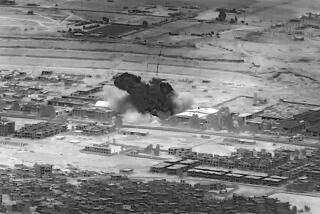Security Said to Be Improving in Iraq
WASHINGTON — Security in Iraq is improving despite a series of attacks on American troops that are part of a campaign orchestrated by saboteurs loyal to Saddam Hussein, L. Paul Bremer III, the U.S. civilian administrator for Iraq, said Thursday.
U.S. intelligence sources cannot confirm rumors that Hussein is secretly directing the opposition, but the perception that he is involved has hindered efforts to rebuild the country, Bremer said.
“I think it does make a difference because it allows the Baathists to go around in the bazaars and in the villages, which they are doing, saying, ‘Saddam is alive and he’s going to come back,’ ” Bremer told reporters at the Pentagon via videoconference from Baghdad. “We have to obviously continue to leave no stone unturned in the search for Saddam.”
Bremer spoke to the House Armed Services Committee and to Pentagon reporters after a U.S. Apache helicopter was shot down in an attack that Iraqi National Congress leader Ahmad Chalabi said was probably directed by Hussein himself. Coalition ground forces rescued the crew.
The continuing attacks have rankled congressional leaders, such as Rep. Ike Skelton (D-Mo.), the top Democrat on the House Armed Services Committee. “Not a day goes by when one of our soldiers isn’t killed, and we need a plan for security in Iraq, in part to protect our troops, but also to bring stability to the Iraqi people,” Skelton said.
Chalabi contended that the attack that downed the helicopter was conducted by “forces who are working under Saddam’s control.”
Emerging from a meeting with House Republicans at the Capitol, Chalabi said forces loyal to the deposed leader have been circulating rumors and leaflets with Hussein’s picture to try to mobilize resistance in Sunni Muslim areas of central Iraq.
“Saddam Hussein, I believe, is still alive, and he is still inside Iraq working,” Chalabi said.
Hussein has been “moving around a lot,” he said, and “has put a price on American soldiers.” The Iraqi National Congress leader added that Hussein, using some of the fortune plundered by his family, has been paying agents to agitate on his behalf while he is in hiding.
Chalabi’s group of anti-Hussein exiles won strong support from the Pentagon before the war, but in recent weeks critics have questioned whether the organization provided the Bush administration with information that exaggerated the threat from Hussein’s alleged arsenal of illegal weapons.
Chalabi, an Iraqi-born banker who recently returned after decades living abroad, insisted that there was “no hyping of information; there was no information that was given that was not substantiated.”
He also chided U.S. authorities for not making better use of the intelligence available from pro-American Iraqis in the country. That information could be used to track illegal weapons and find Hussein, he said.
Among the factors driving opposition to the U.S.-led occupation is the unemployment rate, which Bremer put at greater than 50%. Urging Congress to be patient, Bremer said a recently announced $100-million emergency construction program would help get Iraqis back to work, but he warned that the country’s economic problems would take time to repair.
“This economy was flat on its back before the war, and it’s in even worse shape now,” he said.
Among the problems left by the war is a jobless military that outside estimates have put as high as 500,000 troops. That pressure should ease over the next few weeks as the civilian administrators select training and recruiting sites for a new Iraqi army, Bremer said. Most analysts believe that the new army will be much smaller than the massive arsenal of men and machines used by Hussein to wage war against Iran, Kuwait and the United States over the last two decades.
More to Read
Sign up for Essential California
The most important California stories and recommendations in your inbox every morning.
You may occasionally receive promotional content from the Los Angeles Times.











